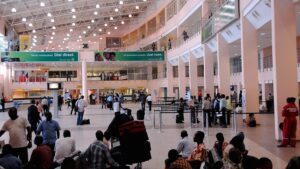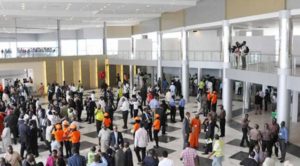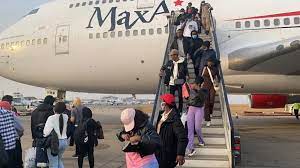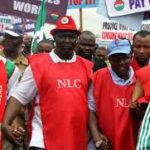
Domestic airlines may have lost N50 billion revenue in the last one week, as a result of low passenger traffic experienced after the Presidential, Senate and House of Representatives elections, which held February 25, 2023.
The low passenger traffic has been attributed to the order given by the federal government, which restricted movement of people on the day of election, a development that forced air passengers to stay away from airports, even after the elections.
THISDAY authoritatively learnt that all the 10 domestic airlines operating in the country scaled down their operations to avoid further loss of funds and they have expressed fears that if passenger movement does not pick up in a short time, some of the airlines would face sustainability problem.
The Managing Director and CEO of Aero Contractors, Captain Ado Sanusi, affirmed to THISDAY that there was very low passenger movement at the airports and that airlines were losing huge revenue due to the development. He however noted that the airline envisaged it and reduced its operations due to restriction of movement on the day of election, adding that after the election, passengers were still not coming to the airports, and that the airline had to readjust its operations.
He further said even after the airline reduced its flights, the low passenger traffic continued to affect its operations and the airline continued to lose money on fixed costs like insurance, adding that if the airline is operating and earning revenues, it will be able to offset the fixed costs.
“It is very true that there is drastic reduction in passenger traffic at the airports. We anticipated that there would be low passenger traffic due to the restriction of movement but we found out that after the election, passengers were not coming to the airports, so we rescheduled our flights. Although we are not burning fuel but fixed costs like insurance are still running. So if we are not operating, we won’t earn money to pay for these costs. So the low passenger traffic is affecting our operations. If the low passenger traffic continues, it will also affect the sustenance of our operations,” he said.
Also speaking, the Chief Operating Officer of Ibom Air, George Uriesi, told THISDAY that airlines experienced low passenger traffic and that it became so low that the airline had to adjust its flight schedules.
He said that Ibom Air reduced operations by 60 per cent but it has picked up again to 70 per cent, expressing the hope that the worst time is over with the conclusion of the presidential election. He believes that henceforth passenger traffic will begin to build up.
“There was drastic reduction of passenger traffic at the airports; that we reduced operations by 60 per cent but we have gone back to 70 per cent. It looks like the number (of passengers) is building up. It is hard to predict whether it would continue to build up but presidential election has been concluded and presidential election carries more weight than other elections, so hopefully things will begin to return to normal. So I believe it will continue to pick up,” Uriesi said.
A source from Air Peace told THISDAY that the airline also scaled down its operations in response to the poor load factor, which is being experienced by every airline.
“Passengers deserted the airports so the airlines have to scale down operations. This is a general problem. People are scared of travelling because of uncertainty. We strategically scaled down operations like other airlines. That was a proper thing to do. Our operations are going on well but we are adjusting our flights in response to the realities, which I know is temporary,” the source said.
An official of Arik Air told THISDAY that the airline also reduced capacity and observed that 2023 was relatively the worst election year since he started working for the airline. He said there was always an upsurge in passenger traffic in the months before and after an election, but this year was the worst when compared to 2015 and 2019 election years.
He also said that he was not optimistic that passenger traffic would suddenly pick up, noting that there might be other factors that contributed to the low passenger movement at the airports, including cash crunch.
“We reduced capacity. There was no point burning fuel without passengers. We have to scale down our operation. As things stand now, it is difficult to predict whether the situation will pick up soon. This year has defied all projections. In fact, this year is quite different from previous elections years. We are hoping there will be movement of passengers going forward, to enable them return to the airports. I witnessed 2015 and 2019 elections as an aviator. January to May in election year was always a boom, until this year. Crash crunch and the Central Bank of Nigeria (CBN) may have had a role to play because there is cash crunch, even though airlines receive payments mostly through transfer.
“We are just praying; we are bleeding seriously but we are hoping for the best. Hopefully after the governorship elections I expect passenger traffic will begin to pick up,” the official said.

THISDAY visited the Murtala Muhammed Airport Domestic Terminal (MMA2) and the General Aviation Terminal (MMA1) on Monday and Tuesday this week and observed that after early morning flights, the airport facilities remain empty with few passengers trickling in and out the airport. THISDAY also observed that airlines that have small aircraft like Embraer 145, ATR, Dash 8 and Bombardier CRJ 900, deployed them instead of bigger aircraft like the Boeing 737, because even in the early hours passenger turnout was still very low.
THISDAY






